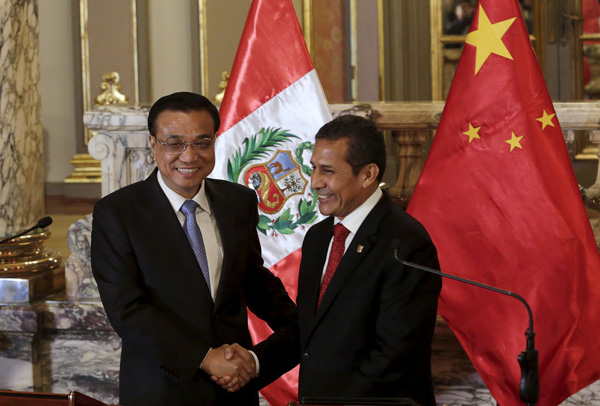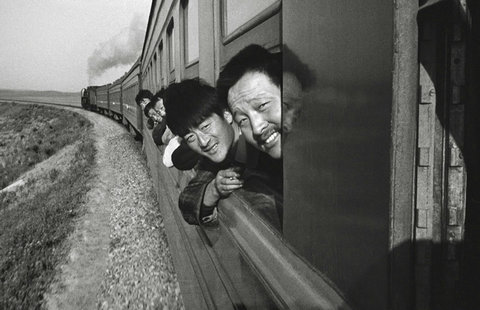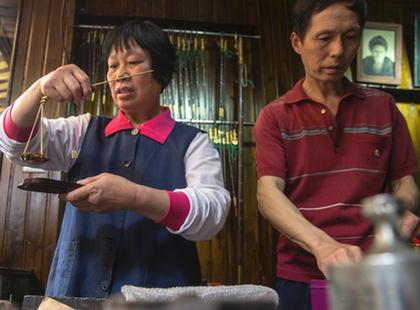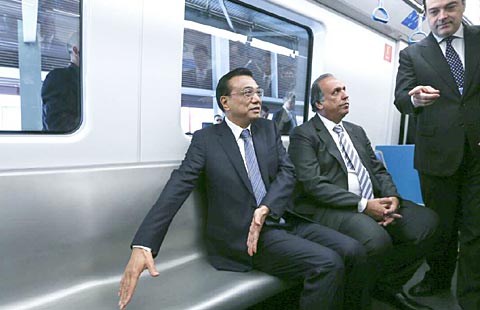China, Peru to diversify trade focus
Updated: 2015-05-23 09:55
By ZHAO YINAN in Lima and ZHANG YUNBI in Beijing(China Daily USA)
|
||||||||
 |
|
Chinese Premier Li Keqiang (L) and Peru's President Ollanta Humala shake hands at the government palace in Lima, May 22, 2015. [Photo/Agencies] |
China and Peru signed deals on Friday to cooperate on industrial production and transportation in an effort diversify a bilateral economic exchange that had been focused on natural resources.
After a welcoming ceremony with cavalries and a military band, Chinese Premier Li Keqiang and Peru President Ollanta Humala witnessed the signing of 10 agreements on investment, transportation, hydropower development, agriculture and education that followed a two-hour meeting.
Also launched was a feasibility study for a transoceanic railroad linking Peru's Pacific Ocean ports with Brazil's Atlantic Ocean facilities.
"The construction of the railroad will expand bilateral trade and people exchanges between China and South America, especially with the countries along the Atlantic coast," Li said after the signing ceremony.
China, Brazil and Peru agreed that the study must be beneficial to economic and social development but also environmentally friendly.
"China respects the culture of Latin America as well as the tropical forestry that has nurtured such a culture," Li said.
Despite their geographic distance, China and Peru have great potential in cooperation, and such cooperation will not only benefit the two countries, but also the Asia-Pacific region and the continent, Li said.
Peru's president said the completion of the transoceanic railroad will promote trade and contribute to the economic growth of the three countries involved.
The bilateral free trade agreement between China and Peru took effect in 2010. Since 2012, China has been Peru's main trading partner and the leading destination for Peru's exports.
In 2014, China also became Peru's main supplier of capital goods and leading investor, with $14 billion invested. China is now Peru's second largest trading partner, its largest export market and its second-largest source of imports. Two-way trade reached $14.66 billion in 2013, a year-on-year rise of 6.3 percent.
The Peruvian government was working to diversify domestic production by boosting nontraditional exports, such as seaweed meal, giant squid, fruit and vegetables, to reduce its reliance on raw material exports.
As part of that push, Peru's nontraditional exports to China reached more than $467 million at the end of 2014, double that of four years ago.
The goal is to reach "$25 billion in 10 years", said Ana Deusta, the representative of the Association of Peru's Agrarian Products Unions. She said that among the challenges facing the South American country was increasing its agricultural and fisheries production, and finding new markets, such as China, where demand for foodstuffs is growing steadily.
Economist Fernando Gonzales-Vigil said FTAs such as the one signed between Peru and China fulfill the objective of diversifying domestic production.
He said that the positive aspect of the bilateral relationship was that it had built a strategic partnership, whose strength was consolidating not just trade, but also investment exchange, through the presence of China's ICBC in the country, one of the five largest banks in the world.
zhaoyinan@chinadaily.com.cn
- Building collapse in Guizhou caused by landslide: govt
- Xi welcomes Japan delegation but warns against historical distortion
- Chinese Vice-Premier stresses flood control
- China to draft more social work standards to improve service
- Hospital fee adjustments won't raise medical bills
- Newspaper tells staff to start own business

 Colombia: A birdwatcher's paradise
Colombia: A birdwatcher's paradise
 Journey of a migrant girl from village to ad world
Journey of a migrant girl from village to ad world
 Photographer captures Chinese on the train
Photographer captures Chinese on the train
 Hou Hsiao-Hsien's The Assassin premieres in Cannes
Hou Hsiao-Hsien's The Assassin premieres in Cannes
 Top 10 highest-paid white-collar jobs in China
Top 10 highest-paid white-collar jobs in China
 The dying craft of balance scales
The dying craft of balance scales
 Culture Insider: Six things you may not know about Grain Buds
Culture Insider: Six things you may not know about Grain Buds
 Premier Li rides on new China-made train in Rio de Janeiro
Premier Li rides on new China-made train in Rio de Janeiro
Most Viewed
Editor's Picks

|

|

|

|

|

|
Today's Top News
China, Peru agree on feasibility study on transoceanic railway
China manufactures first
car for US market
Wisconsin hopes to make cheeseheads in China
China, Peru to diversify trade focus
Li: 'Great potential' for Sino-Colombian ties
Green-tea flavored coffee: a simile for cultural ties
Beijing responds to surveillance by US plane
Beijing sets out its rights after reports of incursion
US Weekly

|

|







